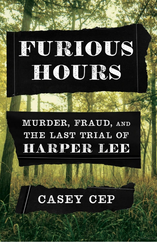A WRITER'S WIT |
My Book World

This fascinating book unfolds by way of three sections. In the first, Cep brings to life a decades-old Alabama story of insurance fraud in which one Rev. Willie Maxwell begins buying up life insurance policies on relatives and others close to him. If that isn’t unusual enough, then each one of those persons begins to die in car “accidents” or by other strange circumstances. Even stranger, Cep makes clear, is that for some reason law enforcement cannot seem to pin these crimes on the prime suspect: Willie Maxwell. When Maxwell attends the funeral of the last victim, a relative of the deceased pulls out a revolver and kills the minister.
The second section of the book is about the attorney who not only helps the minister stay out of prison for years previous to the murder but who is so skilled that he gets an acquittal for the minister’s murderer. The attorney himself is a colorful figure, a liberal Democrat who throws caution to the wind and runs for office. After he wins, his actions are too liberal for some and he is harassed (in a dangerous KKK style) out of office, never running again. Along the way, he makes friends with author Harper Lee, known for her novel, To Kill a Mockingbird.
The reason the two become acquainted is that Harper Lee is attempting to write a book, à la her friend Truman Capote’s In Cold Blood, about the Reverend (The Reverend also being her working title). After all, when Mockingbird was finished, Lee had little to do, and not yet much money, so Capote hired Lee as his assistant to help him research his book. And what a great assistant she was. Cep makes clear that, in all, Lee offers Capote at least 150 pages of typewritten notes. Her talent is combing the physical landscape for specific details; his has more to do with affect, interviewing the related parties, getting them to open up. Lee spends years apparently applying the same journalistic skills to the Maxwell case, but she ultimately abandons the book, believing she just doesn’t have enough information to make it a great book. Cep’s portrayal of Lee is one that readers may not be familiar with: an alcoholic (she eventually, unlike Capote, gets clean); a millionaire who lives, in some ways, like the poorest among her; someone who writes because she loves it, not because she must make a living from it; her own kind of philanthropist, taking care of people and causes she believes in.
Cep weaves together these three strands into one compelling narrative which contributes to even a larger picture: a last gasp of the Old South and its many, many contradictions. A descendant of a slave who allegedly kills members of his own race. A liberal attorney who attempts to evolve the white race in his home state of Alabama. And a writer, childhood friends with Truman Capote, who may be more Libertarian than Liberal, never really finding her rightful place in the American canon of literature.
NEXT FRIDAY: My Book World | TBD



 RSS Feed
RSS Feed